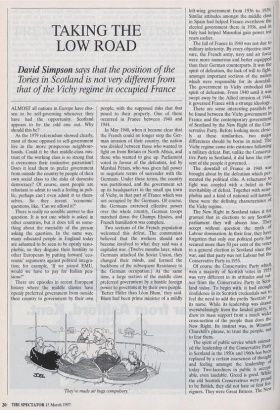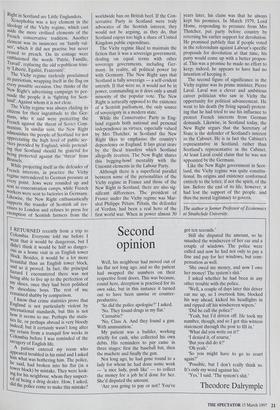TAKING THE LOW ROAD
David Simpson says that the position of the
Tories in Scotland is not very different from that of the Vichy regime in occupied France
ALMOST all nations in Europe have cho- sen to be self-governing whenever they have had the opportunity. Scotland appears to be the odd one out. Why should this be?
As the 1979 referendum showed clearly, most of those opposed to self-government live in the more prosperous neighbour- hoods. Could it be that middle-class mis- trust of the working class is so strong that it overcomes their instinctive patriotism? Does it lead them to prefer government from outside the country by people of their own social class to the risks of domestic democracy? Of course, most people are reluctant to admit to such a feeling in pub- lic, perhaps can't even admit it to them- selves. So they invent 'economic' questions, like, 'Can we afford it?'
There is really no sensible answer to this question. It is not one which is asked in other countries, but it does tell us some- thing about the mentality of the person asking the question. In the same way, many educated people in England today are ashamed to be seen to be openly xeno- phobic, so they disguise their hostility to other Europeans by putting forward 'eco- nomic' arguments against political integra- tion; for example, 'If we joined EMU, would we have to pay for Italian pen- sions?'
There are episodes in recent European history where the middle classes have openly preferred government from outside their country to government by their own people, with the supposed risks that that posed to their property. One of these occurred in France between 1940 and 1944.
In May 1940, when it became clear that the French could no longer stop the Ger- man invasion of their country, the nation was divided between those who wanted to fight on from Britain or North Africa, and those who wanted to give up. Parliament voted in favour of the defeatists, led by Marshal Petain, who was given full power to negotiate terms of surrender with the Germans. Under these terms, the country was partitioned, and the government set up its headquarters in the small spa town of Vichy, in that part of Ftance which was not occupied by the Germans. Of course, the Germans exercised effective power over the whole country, German troops marched down the Champs Elysees, and French humiliation was complete.
Two sections of the French population welcomed this defeat. The communists believed that the workers should not become involved in what they said was a capitalist war. (Twelve months later, when Germany attacked the Soviet Union, they changed their minds, and formed the backbone of the subsequent Resistance to the German occupation.) At the same time, a large section of the middle class preferred government by a hostile foreign power to government by their own people. `Better Hitler than Leon Blum,' they said. Blum had been prime minister of a mildly `They've made air bugs compulsory.' left-wing government from 1936 to 1939. Similar attitudes amongst the middle class in Spain had helped Franco overthrow the elected government there in 1936, and in Italy had helped Mussolini gain power ten years earlier. The fall of France in 1940 was not due to military inferiority. By every objective mea- sure, the French army, navy and air force were more numerous and better equipped than their German counterparts. It was the spirit of defeatism, the lack of will to fight, amongst important sections of the nation which were responsible for its downfall. The government in Vichy embodied this spirit of defeatism. From 1940 until it was swept away by the Allied invasion of 1944, it governed France with a strange ideology. There are some interesting parallels to be found between the Vichy government in France and the contemporary government of Scotland by the New Right of the Con- servative Party. Before looking more close- ly at these similarities, two major differences should be borne in mind. The Vichy regime came into existence following a military defeat. But, unlike the Conserva- tive Party in Scotland, it did have the con- sent of the people it governed. The downfall of France in 1940 was brought about by the defeatism which per- meated the political elite. A reluctance to fight was coupled with a belief in the inevitability of defeat. Together with xeno- phobia and a kind of national self-hatred, these were the defining characteristics of the Vichy regime. The New Right in Scotland takes it for granted that in elections to any Scottish parliament they will always lose. They accept without question the myth of Labour domination. In their fear, they have forgotten that only one political party has secured more than 50 per cent of the votes in a general election in Scotland since the war, and that party was not Labour but the Conservative Party in 1955. Of course the Conservative Party which won a majority of Scottish votes in 1955 was very different in its attitudes and val- ues from the Conservative Party in Scot- land today. To begin with, it had enough confidence in its Scottish credentials not to feel the need to add the prefix 'Scottish' to its name. While its leadership was drawn overwhelmingly from the landed gentry, it drew its mass support from a much wider cross-section of the people than does the New Right. Its instinct was, in Winston Churchill's phrase, to trust the people, not to fear them.
The spirit of public service which animat- ed the leadership of the Conservative Party in Scotland in the 1950s and 1960s has been replaced by a certain coarseness of thought, and feeling amongst the leadership °I today. Two-facedness in public is accept- able, even laudable. Greed is good. While the old Scottish Conservatives were proud to be British, they did not hate or fear for- eigners. They were Great Britons. The New Right in Scotland are Little Englanders. Xenophobia was a key element in the ideology of the Vichy regime, which cast aside the more civilised elements of the French conservative tradition. Another element was its insistence on 'family val- ues', which it did not practise but never ceased to preach. On its coinage were emblazoned the words Tatrie, Famille, Travail', replacing the old republican trini- ty `Liberte, Egalite, Fraternite. The Vichy regime tirelessly proclaimed its patriotism, wrapping itself in the flag on every possible occasion. One thinks of the New Right's advertising campaign to per- suade the people it is 'fighting for Scot- land'. Against whom it is not clear. The Vichy regime was always chiding its Citizens for their ingratitude to the Ger- mans, who it said were protecting the French against the threat of Soviet Com- munism. In similar vein, the New Right admonishes the people of Scotland for not appreciating the high level of public ser- vices provided by England, while pretend- ing that Scotland should be grateful for being protected against the 'threat' from Brussels.
While projecting itself as the defender of French interests, in practice the Vichy regime surrendered to German pressure at every point. Jews were rounded up and sent to concentration camps, while French workers were sent to factories in Germany. Likewise, the New Right enthusiaStically supports the transfer of Scottish oil rev- enues to London and refuses to press for exemption of Scottish farmers from the worldwide ban on British beef. If the Con- servative Party in Scotland were truly advocates of the Scottish interest, they would not be arguing, as they do, that Scotland enjoys too high a share of United Kingdom public expenditure.
The Vichy regime liked to maintain the fiction that it was a sovereign government, dealing on equal terms with other sovereign governments, including Ger- many. In reality, all political power lay with Germany. The New Right says that Scotland is fully sovereign — a self-evident untruth. If that were so, it would not be in power, commanding as it does only a small minority of the popular vote. The New Right is naturally opposed to the existence of a Scottish parliament, the only source of sovereignty in a modern state.
While the Conservative Party in Eng- land regards both national and personal independence as virtues, especially valued by Mrs Thatcher, in Scotland the New Right likes to emphasise the country's dependence on England. It lays great store by the fiscal transfers which Scotland allegedly receives. The New Right shares this begging-bowl mentality with the Unionist elements in the Labour Party.
Although there is a superficial parallel between some of the personalities of the Vichy regime in France and those of the New Right in Scotland, there are also sig- nificant differences. The president of France under the Vichy regime was Mar- shal Philippe Petain. Main, the defender of Verdun, had been a real hero of the first world war. When in power almost 30 years later, his claim was that he always kept his promises. In March 1979, Lord Home, responding to pressure from Mrs Thatcher, put party before country by reversing his earlier support for devolution. He promised publicly that if people voted in the referendum against Labour's specific proposals for devolution at that time, his party would come up with a better propos- al. This was a promise he made no effort to keep; indeed, he appears to have had no intention of keeping it.
The second figure of significance in the Vichy regime was its prime minister, Pierre Laval. Laval was a clever and ambitious career politician who saw in Vichy the opportunity for political advancement. He went to his death (by firing squad) protest- ing that he had tried to use his influence to protect French interests from German demands. Likewise, in Scotland today, the New Right argues that the Secretary of State is the defender of Scotland's interest in the Cabinet. He is in fact the Cabinet's representative in Scotland, rather than Scotland's representative in the Cabinet. At least Laval could claim that he was not appointed by the Germans.
Like the New Right government in Scot- land, the Vichy regime was quite constitu- tional. Its origins and existence conformed entirely to the letter, if not the spirit, of the law. Before the end of its life, however, it had lost the support of the people, and thus the moral legitimacy to govern.
The author is former Professor of Economics at Strathclyde University.



































































 Previous page
Previous page